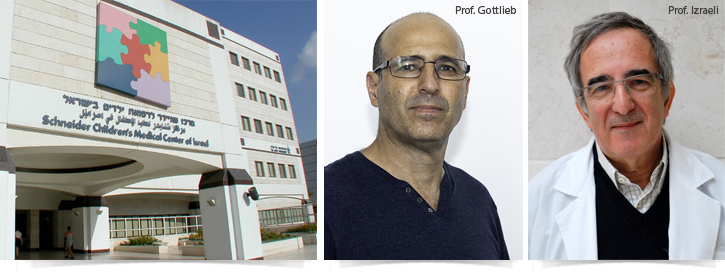page content
Skip page contentGroundbreaking Research

An international group of investigators comprised of researchers from the Hemato-Oncology Division at Schneider Children's, Tel Aviv University, The Technion and the University of Glasgow, reported a breakthrough that could influence treatment in the spread of childhood lymhoblastic leukemia to the brain. The paper was published in the prestigious international scientific journal Nature Cancer.
The research focused on severe lymphoblastic leukemia, the most common cancer in children. Although the rate of recovery from this disease is relatively high, treatment is difficult and accompanied by many latent side-effects.
Since one of the greatest dangers in this disease is metastatic spread to the brain, children diagnosed with severe lymphoblastic leukemia receive preventive care to protect the brain from secondary growths. Treatment today is based upon intravenous administration of chemotherapeutic drugs, and often accompanied by cranial radiation. The treatment can lead to further complications such as injury to brain function because those same chemothereapeutic drugs also affect healthy brain cells. Hence the global effort to develop more selective therapies that will only target leukemia cells and not brain cells. The research study showed for the first time that the solution is hidden in fatty acids.
Fatty acids are essential components of cells and even leukemia cells need them. Sufficient fatty acids are found in leukemia cells in bone marrow and the blood. However, when these cells spread to the brain, they reach an area low in fatty acids. According to the published research, in order for these cells to continue to exist and thrive there, they develop an ability to self-produce fatty acids.
Based on these assumptions, investigators surmised that medications that suppress the production of fatty acids would prevent the leukemia cells from producing their own, thus "starving" them and quashing their ability to thrive in the brain. Use of these drugs in mice indeed halted the development of secondary leukemia cells in the brain.
The drugs used in the current study are under development and therefore are still not approved for application in humans. Yet, the research findings open a new window of opportunity for more precise treatment, and undoubtedly less toxic, to contain the spread of leukemia to the brain.
The article is the result of collaboration between groups of three researchers and conducted by three young investigators: Dr. Angela Maria Sabino from the laboratory of Prof. Shai Izraeli, Director of the Hemato-Oncology Division of Schneider Children's, and the Department of Molecular Biochemical Genetics at the Medical Faculty at Tel Aviv University; Dr. Sarah Isabel Fernandez, from the laboratory of Prof. Eyal Gottlieb of the Rappaport Research Institute and Rappaport Faculty of Medicine at the Technion; and Dr. Orianne Ulibaris, from the lab of Dr. Christian Hallasie, from the University of Glasgow. A certain portion of the research was performed in the lab of Prof. Michael Heres of Sloan-Kettering Cancer Hospital in New York.
The research findings are not only relevant to severe lymphoblastic leukemia, but also to other types of childhood and adult cancers. This is because the majority of fatalities from cancer are not caused by the initial tumor but because of secondary growths in other organs. The current research, which indicates acclimation of cancer cells to the organs to which they spread, paves the way for biological therapies that will block the adaptation mechanisms and thus halt the spread of metasteses.
The research was support by the Chief Scientists at the Ministry of Science and Technology, The Italian Foundation of Cancer Research (FIRC), the William and Elizabeth Davis Foundation, the Laura and Ike Perlmutter Foundation, the Israel-German Foundation, the Norman and Sadie Lee Foundation, the National Foundation for Science, the European Union (ERA, NET TRASCALL program), the Foundation for Cancer Research in Israel and UK Cancer Research. The project also received funding from the EU's Horizon 2020 Research and Innovation Programme under the Marie Sklodowska-Curie grant agreement META-CAN #766214.




.jpg?BannerID=98)



.jpg?BannerID=97)

.jpg?BannerID=96)